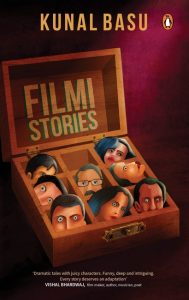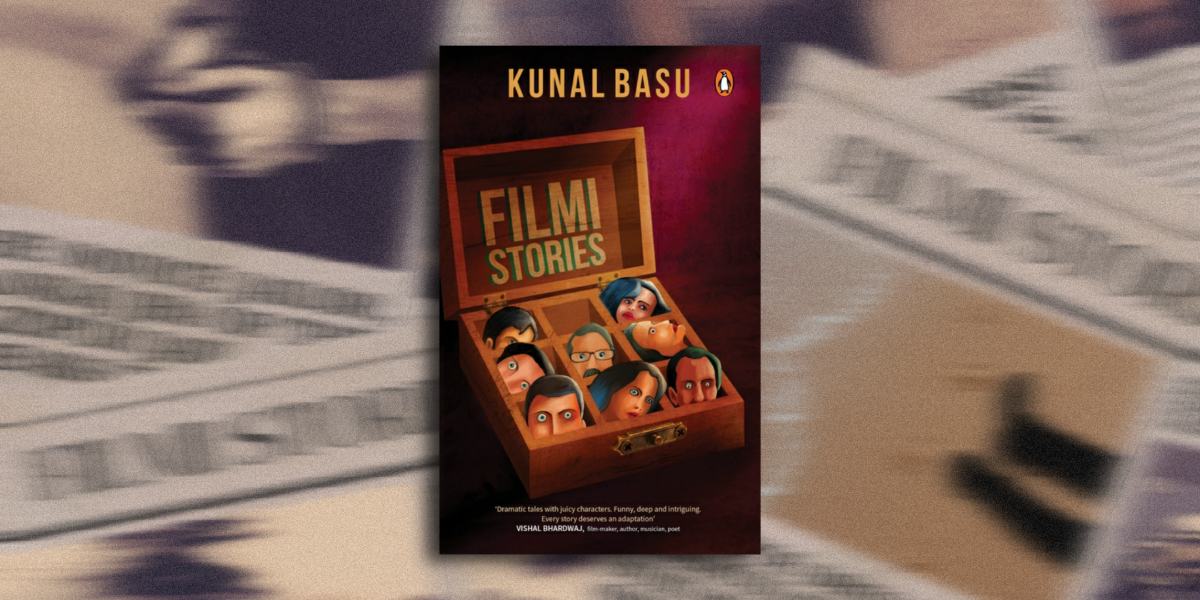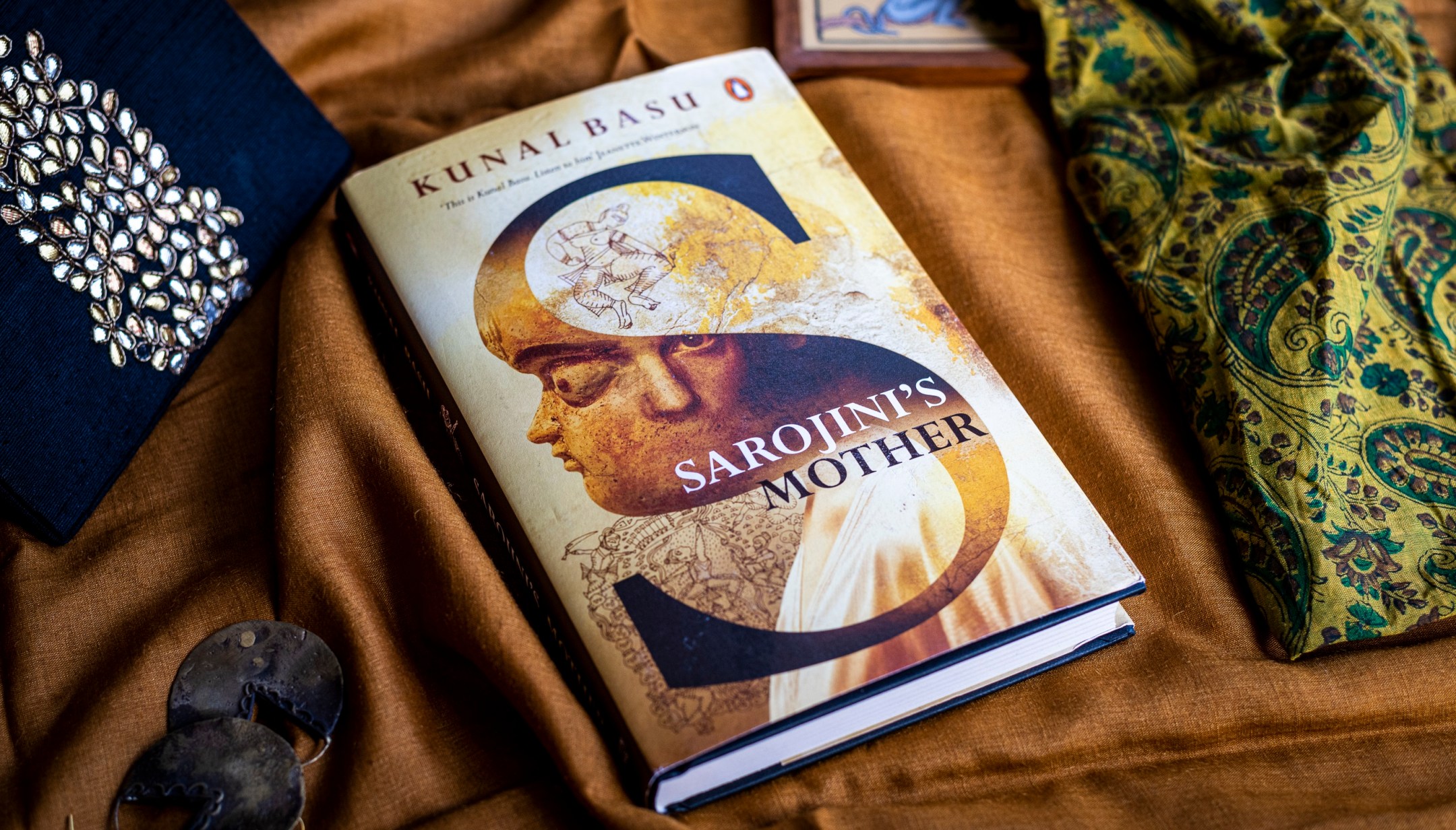Life can be chaotic right? But how often does it transform into something truly ‘Filmi’? Author Kunal Basu in his book Filmi Stories has vowed to do just that. Get ready to explore this story-telling masterpiece, where we encounter unforeseen terrors and adventures, surreal comedies, and apocalypses that will shake you to the core. And amidst it all, you will discover the sublime poetry of everyday life.
So get into a comfortable spot, grab some popcorn, and read this excerpt from Filmi Stories that rival the excitement of watching a thrilling movie.

***
As he sat on the bus travelling from the city’s western suburb to the airport, the morning’s events flashed through Rishi’s mind like the madly spinning reel of a film. Like all days that spelt chaos, the morning had been deceptively calm. He had risen to the sing-song of his neighbour’s bird, jumped the queue to the communal toilet complaining of an upset stomach and then secured a seat, miraculously, on the congested local train on his way to work. Haste was a common refrain in the life of Bombay residents, and his morning was no different from that of millions who found peace in the daily hassle of the city. On that day though he was doubly keen to reach his office before the padlock had been opened by the talkative security guard, ever ready to offer a rundown of noteworthy events—from bank heist to waterlogging. It was Rosy’s, Rosalind Yasmin de Rosario’s, birthday, and Rishi wished to reach her cubicle next to their boss’s plush office before the employees arrived. He had spent a whole week scouting for a proper birthday card and struck gold with one shaped like a pink rose that allowed the petals to be opened to pen one’s greetings inside. May you always feel happy and never sad, he wrote, signing off with your loyal friend Rishi.
Most of the day was spent waiting, Rishi recalled, while travelling on the airport bus. From his own cubicle, a good 50 yards away from Rosy’s, her face was visible only in profile. True to Monday morning rush, she could be seen stacking up files for the boss to sign, taking calls, reaching inside her purse for a breath freshener after her tea. Had she dropped the card, left by Rishi on her table, into the wastepaper bin, mistaking it for junk mail? He sat through the whole morning, forfeiting a cigarette break, just to keep an eye on her. By noon, waiting had turned to despair. His thoughts strayed over to several birthday cards he’d left for female colleagues in the past, hoping for a favourable outcome. For an out-of-state person like him, who hailed from a city far from Bombay, without family or friends who might assume the task of matchmaking, he saw the birthday card as his only hope. A card followed by an invitation to tea, a stroll in the nearby park, trips to the mall in the guise of shopping, ending with the final arrangement.
By 3 in the afternoon, he had given up on his prospect and returned to the thorny business of balancing the firm’s monthly ledger when Rosy walked down those fifty yards to his cubicle. Taking just a moment to recover, Rishi was about to wish her on her special day, when she cut him short.
‘Mr Manjrekar is waiting to speak with you. He has asked you to come at once.’
Me?’ Rishi stuttered.
‘Yes, you,’ Rosy answered in a matter-of-fact way and walked a step ahead of him to the boss’s office.
Like all employees, past and present, Rishi feared his boss. He had the habit of asking awkward questions, giving his employees no time to think before providing the answer himself with an air of disdain. As an MBA, he assumed a rightful superiority over his graduate employees and fell into lecturing them on topics that had nothing to do with their daily business. Normally, he allotted no more than 3 minutes to Rishi whenever he was summoned to his office, but on that day, he asked him to take a seat and came around to lay a hand on his shoulder.
He will fire me, Rishi thought, offer some kind of business logic that was beyond his comprehension. Maybe he’s found out about the birthday card and the several before this one and concluded that he was a threat to his female staff.
‘Word has come from our Patna office about your mother,’ Mr Manjrekar paused, rubbing his hand on Rishi’s shoulder blade by way of a massage. ‘Your uncle has been trying to contact you by phone from your hometown, but something appears to be wrong with your number. He is trying to pass on an urgent message to you.’
‘What message, Sir?’ Rishi managed to ask.
‘Your mother is sick,’ Mr Manjrekar’s voice turned a touch gentler. ‘She has been taken to the hospital. Maybe it’s nothing very serious. Could be the pathogenesis of a condition beyond the patient’s bandwidth.’
Rishi’s eyes widened, unable to follow what Mr Manjrekar meant. Standing beside him, he could sense Rosy nodding her head in agreement.
Returning to his seat, Mr Manjrekar adjusted his tie and spoke calmly. ‘No matter her condition, you must go to Patna and assess the situation first-hand. Rosy has already bought your ticket, and you can leave now to collect your things from home and head off to the airport.’
The flight leaves at 7.45 p.m. It’s the only one to Patna from Bombay this evening.’ On cue, Rosy handed Rishi his ticket and turned on her heels to return to her cubicle.
‘I’m sure things will be fine back home,’ Mr Manjrekar concluded his 5-minute meeting with Rishi, adding, ‘We’ll consider your absence as a casual leave.’
Dazed by the event, Rishi took the wrong turn as he left Mr Manjrekar’s office, reaching the staff toilet at the end of the corridor, which was shut for cleaning. Then he retraced his steps back to his seat, passing by Rosy’s desk. The birthday card, he found to be still sitting at the exact spot he’d left it, yet unopened.
***
Get your copy of Filmi Stories by Kunal Basu wherever books are sold.








